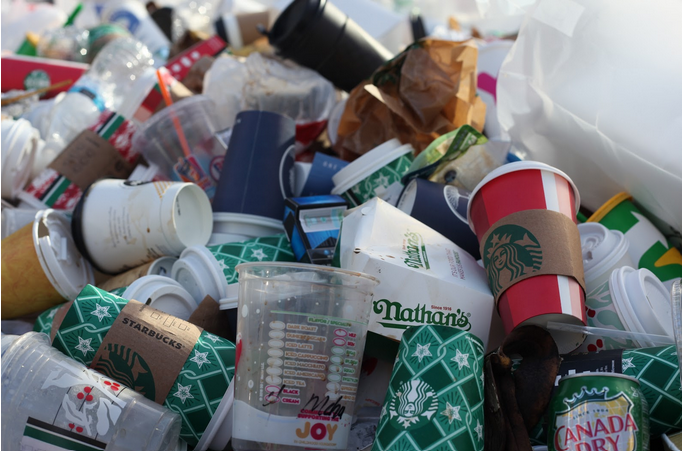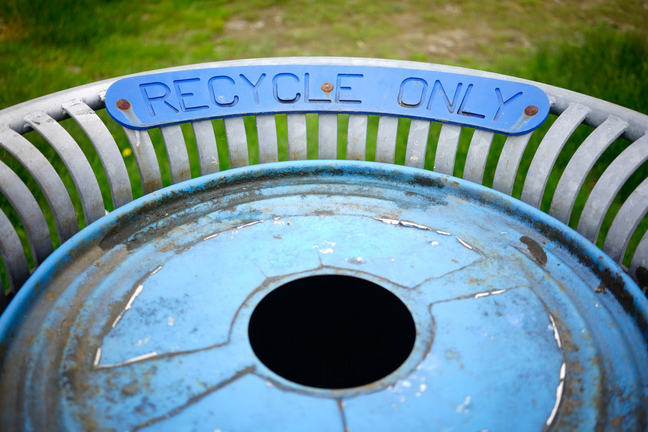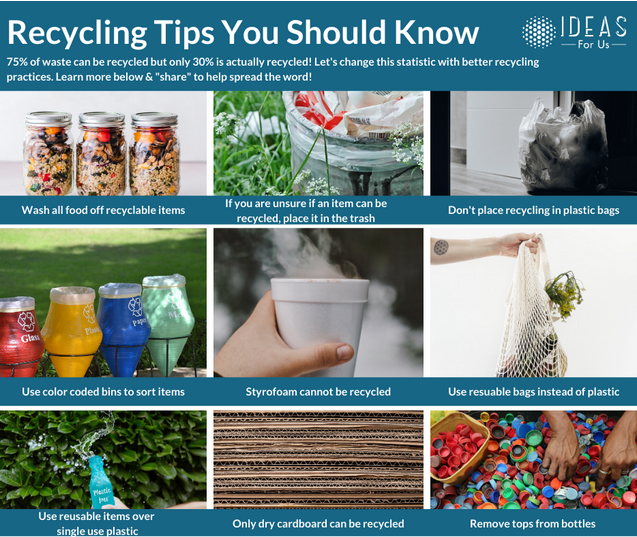Florida’s recycling goal by 2020 was to have 75% of all trash be recycled.
With 2020 here, Florida has fallen short of that goal. In 2019, Florida’s recycling rate was at 49%, way below the intended 75% (1). Florida consists of 67 counties and as of 2019, only 2 out of the 67 achieved that goal (2). Just in Orange County, the recycling rejection rate is 85%. Why has Florida not been able to meet their goal? Lack of knowledge and education concerning recycling are a major contributor along with the lack of standardized labeling for material we can recycle.

Photo by Reiseuhu on Unsplash
Contamination Crisis
Many recycling programs have been stalled by China’s decision to stop accepting our recyclables since the materials transported were often contaminated. Contamination occurs when nonrecyclable materials mix with those that can be recycled. Contamination leads to all the recyclable material being thrown out. In 2018, it was reported that Clearwater sent ⅓ of their recyclable materials to be incinerated because these materials were considered contaminated. Additionally, China’s refusal to accept our recycling left many cities floundering on what to do next, which caused the suspension of some recycling programs. Educating the public on the proper way to recycle would decrease the amount of contamination seen in recyclable material.

Photo by Jasmin Sessler on Unsplash

Photo by Eiliv-Sonas Aceron on Unsplash
Recycling Confusion
Many people want to recycle, but they just don’t know how. Items that people think can be recycled but CANNOT include: pizza boxes that have been stained, plastic bags, plastic utensils, styrofoam, and egg cartons. Especially since more materials could cause contamination than you think, it is best to recycle what you know will not cause any contamination.
Items that CAN be recycled include: plastic bottles, cereal boxes, aluminum cans, and newspapers. Of course, we can recycle many more different items, but the general public is confused about the rules for recycling. Putting recycling in a plastic bag is one of the MAJOR causes for it to be taken to a landfill. If you are unsure of what can be recycled and what cannot check out this Orlando website that allows you to enter the item you want to recycle and tells you whether or not it can be. It may look like items such as pizza boxes and food containers are recyclable, but actually, food and drinks cause contamination.
Recycling Quick Facts

Photo by VanveenJF on Unsplash
- The EPA estimated that while 75% of American waste is recyclable, only about 30% of it is actually recycled (3).
- Over 87% of Americans have access to some sort of recycling program (3).
- An aluminum can is endlessly recyclable (4).
- If every newspaper was recycled it would save around 250,000,000 trees every year (4).
- Plastic garbage that is thrown into the ocean can kill as many as 1,000,000 sea creatures every year (4).
- Glass bottles and jars are recyclable, yet every month enough are thrown out to fill up a skyscraper (4).
- Recycling is the most cost effective way to get rid of trash: it costs $30 per ton to recycle trash, $50 to send it to the landfill, and $65 – $75 to incinerate it (4).
- While motor oil gets dirty, it can be refined and recycled because it does not lose its effectiveness (4).
Falling Behind

Photo by Kai Pilger from Pexels
It’s not just Florida that is dropping the ball on recycling, it is ALL of the United States. The U.S. only comprises 4% of the world’s population, but 12% of all waste comes from the U.S. (5). Germany is the leading nation for recycling. Comparatively, they recycle up to an impressive 68% (6). The U.S. recycles 35%, which is just half of what Germany recycles (5). Germany enforces different colored bins to make recycling easier and to lessen the contamination from mixed items. A system such as this and better labeling will greatly help the U.S. with recycling uncertainty.
How can the U.S. improve their recycling rate?
Firstly, implementing standardized labeling throughout the country would lessen the contamination rate. Recycling in the U.S. can be different throughout the states, so establishing a standard for recyclable materials would improve recycling rates and decrease contamination. Color coded bins, like the ones used in Germany, would help people figure out how to sort their recyclables. Another way to increase recycling, companies could educate the public on what contamination is, how it happens, and how to recycle without contaminating other items. Furthermore,It is essential to start education early by implementing more recycling programs in schools.
What You Can Do:
- Check items to make sure that you can recycle them through your city or county residential recycling program website.
- If you live in a complex that does not provide recycling bins, consider getting together with neighbors and take turns dropping off the recycling to recycling centers close by.
- Do not place plastic bags or the contaminate items into the recycling bin.
- Make recycling fun and easier for kids with color coded bins that have pictures.
- Bring your own to-go cup, container, and straw with you to lessen single-use waste items.

Photo by Paweł Czerwiński on Unsplash
Make recycling a habit! Join organizations like IDEAS for us to become a recycling champion!
Enjoy this recycling infographic & share it with your recycling friends!

Works Cited:
- floridadep.gov/waste/waste-reduction/content/recycling
- http://www.news-press.com/story/tech/science/environment/2019/08/01/lee-charlotte-counties-lead-florida-recycling-rates/1819942001/.
- https://www.dosomething.org/us/facts/11-facts-about-recycling
- http://www.recycling-revolution.com/recycling-facts.html
- http://www.theguardian.com/us-news/2019/jul/02/us-plastic-waste-recycling.
- http://www.lovemoney.com/galleries/89902/countries-with-the-best-and-worst-recycling-rates.
“Aluminum Recycling Facts.” Recycling Facts – A Recycling Revolution, www.recycling-revolution.com/recycling-facts.html.
“Countries with the Best and Worst Recycling Rates.” Live Life Richer with Lovemoney, www.lovemoney.com/galleries/89902/countries-with-the-best-and-worst-recycling-rates.
Holden, Emily. “US Produces Far More Waste and Recycles Far Less of It than Other Developed Countries.” The Guardian, Guardian News and Media, 3 July 2019, www.theguardian.com/us-news/2019/jul/02/us-plastic-waste-recycling.
Jones, Sasha, and Connie Fossi. “RECYCLING CRISIS: Why It Is Getting More Expensive and Difficult in South Florida.” NBC 6 South Florida, NBC 6 South Florida, 3 May 2019, www.nbcmiami.com/news/local/recycling-crisis-south-florida/156655/.
Perry, Mitch. “Recycling’s Problem.” Florida Phoenix, 14 Nov. 2019, www.floridaphoenix.com/2019/08/27/recyclings-problem/.
“Recycling.” Florida Department of Environmental Protection, floridadep.gov/waste/waste-reduction/content/recycling
Rosengren, Cole. “How Recycling Has Changed in All 50 States.” Waste Dive, 15 Nov. 2019, www.wastedive.com/news/what-chinese-import-policies-mean-for-all-50-states/510751/.
Stern, Gabe. “Lee, Charlotte Counties Lead Florida in Recycling Rates.” Press, Fort Myers News-Press, 2 Aug. 2019, www.news-press.com/story/tech/science/environment/2019/08/01/lee-charlotte-counties-lead-florida-recycling-rates/1819942001/.
“The US Recycling System Is Garbage.” Sierra Club, 26 June 2019, www.sierraclub.org/sierra/2019-4-july-august/feature/us-recycling-system-garbage.
Yanes, Nadeen. “Here’s Why Recyclables in Orange County Are Going to the Dump.” WKMG, WKMG News 6 & ClickOrlando, 27 Nov. 2019, www.clickorlando.com/news/2019/11/26/heres-why-recyclables-in-orange-county-are-going-to-the-dump/.
“11 Facts About Recycling.” DoSomething.org, www.dosomething.org/us/facts/11-facts-about-recycling.








